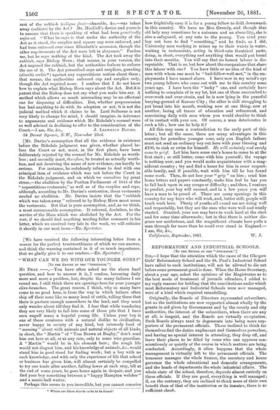[We have received the following interesting letter from a source
for the perfect trustworthiness of which we can answer, mid think the warning contained in it of so much importance, that we gladly give it to our readers.—En. Spectator.]
" WHAT CAN WE DO WITH OUR YOUNGER SONS ?"
[TO THE EDITOR OF THE " SPECTATOR."]
MY DEAR —,--Yon have often asked me the above hard question, and how to answer it is, I confess, becoming daily more and more a problem, but, despite the many failures I see round me, I still think there are openings here for your younger olive-branches. The great reason, I think, why so many have come to no good here, is from the way in which fathers often ship off their sons like so many head of cattle, telling them that there is pasture enough somewhere in the land, and they must only wander about till they find it. I fear that while wandering they are very likely to fall into some of those pits that I have seen engulf many a hopeful young life. Unless your boy is one of those creatures with a natural dislike to civilisation, never happy in society of any kind, but intensely fond of " messing " about with animals and natural objects of all kinds, in short, the " Martin " of " Tom Brown at Rugby," don't send him out here at all, or at any rate, only to some wise guardian. A " Martin " would be in his element here ; the rough life would not disgust him, and his knowledge of animals, &c., would stand him in good stead for finding work ; but a boy with no such knowledge, and with only the experience of life that school or business has given him, will almost certainly be compelled to try one trade after another, falling lower at each step, till at the end of some years, he goes home again in despair, and you find your boy something between a " happy Hampton welsher" and a music-hall waiter.
Perhaps this seems to you incredible, but you cannot conceive
Where are these diserta verba to be found?
how frightfully easy it is for a young fellow to drift downwards, in this country. We have no Mrs. Grundy, and though that old lady may sometimes be a nuisance and an absurdity, she is also a safeguard, at any rate to the young. You send your boy out here to find " something," and he finds, as I did,. University men working in mines up to their waists in water, waiting in restaurants, acting in third-rate theatrical parts, doing, in short, everything and anything that would put bread into their mouths. You will say that no honest labour is dis- reputable. That is so, but how about the companions that shim this labour with one ? You have little or no idea of the kind of men with whom one must be "hail-fellow-well-met," in the em- ployments I have named above. I have now in my mind's eye two young fellows who came out with me to this country some- years ago. I have been the " lucky " one, and certainly have nothing to complain of in my lot, but one of them succumbed to over-work and over-strain, and he is now lying in the peaceful burying-ground of Kansas City ; the other is still struggling to put bread into his mouth, working now at one thing, now at another, losing all traces of education and refinement, and associating daily with men whom you would shudder to think of in contact with your son. Of course, a man deteriorates in such a life ; how can he help it ?
All this may seem a contradiction to the early part of this letter ; but all the same, there are many advantages in this country for penniless younger sons, only you English fathers must not send an ordinary boy out here with your blessing and £100, to sink or swim for himself. He will certainly and surely come to grief. Let him have some one's house to come to at the first start ; or still better, come with him yourself; the voyage is nothing now, and you would make acquaintance with a mag- nificent country ; try and find a home for him in some respect- able family, and if possible, wait with him till he has found some work. Then, do not lose your " grip " on him ; send him home letters and papers constantly, make him feel he has you to fall back upon in any scrape or difficulty ; and then, I venture to predict, your boy will succeed, and in a few years you will have a man to be proud of. There are many openings in this country for any boys who will work, and, better still, people will teach work here. Plenty of youths all round me are doing well and respectably, but they are the ones who were well and wisely started. Granted, your son may have to work hard at the start and for some time afterwards ; but in that there is neither dis- grace nor misfortune, and the magnificent climate here pulls a man through far more than he could ever stand in England.— I am, Sir, &c.,


































 Previous page
Previous page